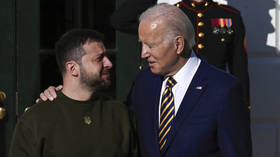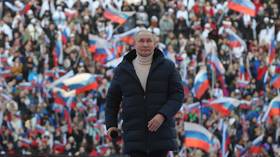Fyodor Lukyanov: Why the US has nothing to lose, and everything to gain, from prolonging the Ukraine conflict

Putting aside the pomp, the theatricals designed tug at the heart strings and the rhetorical chatter, Ukrainian President Vladimir Zelensky’s visit to Washington could indeed be a milestone for the “European security” framework. A recent article by veteran German-American diplomat Henry Kissinger offered a new perspective in that he claimed a neutral status for Ukraine can no longer serve as a subject for negotiation, as the subject is no longer relevant.
Ukraine is forming a powerful and capable armed force, actively assisted by the West, primarily the US, so its formal status – whether it’s a member of NATO or not – no longer matters. It is America's de facto, if not de jure, military ally, in addition to having unique practical experience in a direct large-scale confrontation with Russia. One might add: it is motivated to pursue it.
Elaborating on this thought, it is reasonable to assume that, for the US, it’s even more comfortable for Ukraine to remain outside the formal alliance, as it expands the space for political-military action. There are no legal commitments, the level and scale of support can vary according to the situation at any moment, and the degree of Kiev's loyalty to Washington as the main guarantor of resources is likely to exceed even that shown by Warsaw or the Baltic states. As will the degree of dependence on external aid. Ukraine, like Poland and the Baltics, is likely to become increasingly distrustful of continental Western Europe, as Kiev will interpret its inevitable internal contradictions as an implicit desire to make peace with Russia.
For the US, this sort of “land-based unsinkable aircraft carrier” will come in handy. Such a trained and loyal satellite, on the one hand beside Russia and on the other pointing towards Western Europe – and Kiev’s narrative that thanks to its efforts, the rest of Europe can live in peace and not under Russian bombs – opens up many opportunities. The territorial configuration of Ukraine in this context is unimportant to Washington. Moreover, the preservation of part of the internationally recognised Ukrainian territory under Russian control cements the conflict, and leaves the rump with a reason to fight on.
For this it should be equipped and trained, but all its wishes don’t necessarily need to be fulfilled. As for preparing its forces, it is crucial, for Washington, to enhance Ukraine’s own capabilities so that any subsequent phases of the confrontation can continue without the direct involvement of US and NATO units. This is a very significant point.
The scheme is, in principle, quite rational. There is no guarantee that it will work, because Russia has the power to prevent it (even if, so far, this hasn’t been very visible), but there are few risks for the US. And the notorious European security system – the reform of which was Russia's key demand a year ago – if it ever comes back on the agenda, it will be under very different circumstances. The old approaches and demands will no longer apply.














